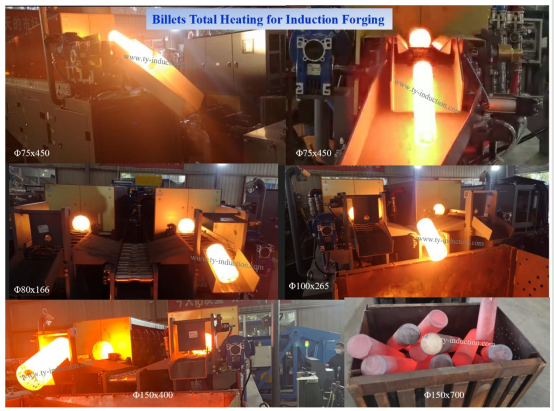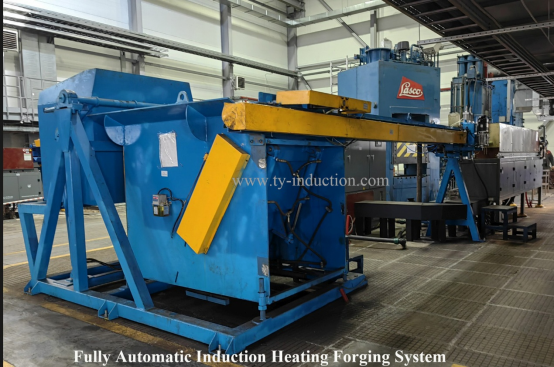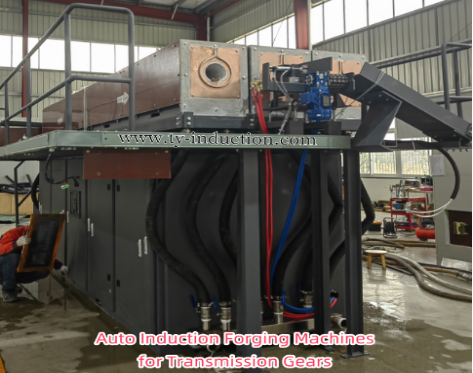Big Forging Plants Turn to Automation to Solve Skilled Labor Shortages
July 19, 2025
The global forging industry faces a major challenge: a skilled labor shortage. Experienced metallurgists, press operators, and finishing specialists are retiring faster than they can be replaced, leaving forges struggling to maintain productivity and quality. Large forging plants, particularly those producing aerospace components, automotive parts, and medical-grade devices, are being hardest hit.

To address this challenge, many large forging plants are turning to Automation and advanced Induction Heating technologies to fill the gap. By integrating robotics, smart sensors, and computer-controlled presses, plants can maintain output, reduce errors, and optimize energy consumption while mitigating the impact of labor shortages.

Several factors contribute to the shortage:
· Aging Workforce: Many skilled operators are approaching retirement, and younger workers are often not entering the industry at the same rate.
· Complexity of Titanium and High-Performance Alloys: Modern surgical tools, aerospace components, and precision industrial parts require highly trained operators capable of managing complex alloys and tight tolerances.
· High Turnover: Physically demanding work, combined with repetitive processes, results in higher turnover, increasing recruitment and training costs.
As a result, forging plants are facing decreased throughput, quality inconsistencies, and increased production costs.

Automation offers a way to reduce dependency on manual labor while improving consistency and productivity. Key areas of focus include:
· Induction Heating Systems: Automated induction furnaces precisely control billet temperatures, reducing the need for manual monitoring and minimizing errors.
· Robotic Material Handling: Robots can load, unload, and transfer heavy billets, reducing physical strain on workers and speeding up production cycles.
· Computer-Controlled Presses: Programmable presses maintain consistent force and timing, essential for producing complex shapes and high-strength alloys.
· Integrated Quality Inspection: Sensors and vision systems monitor each stage of the forging process, detecting defects early and reducing scrap.
By combining these technologies, plants can maintain high output levels with fewer skilled operators, while also improving workplace safety.
TY INDUCTION has partnered with several large forging facilities to address labor shortages through automation. One notable case involved a plant producing titanium surgical instruments for global medical device manufacturers.
Challenges Faced:
· Inconsistent heating of titanium billets due to manual furnace operation.
· Frequent downtime caused by operator fatigue and human error.
· High scrap rates from temperature fluctuations and improper handling.
TY INDUCTION Solutions Implemented:
· High-Frequency Induction Furnace: Automated billet heating with precise temperature control reduced operator intervention and eliminated uneven heating.
· Robotic Handling System: Fully integrated robotic arms moved billets from furnace to forging press, significantly reducing labor dependency.
· Automated Press Control: Hydraulic presses were linked to digital controls, ensuring uniform force application for each part.
· Real-Time Quality Monitoring: Sensors measured temperature, force, and deformation during forging, automatically flagging out-of-spec components.
Results Achieved:
· Throughput Increase: Production capacity increased by 70%, allowing the plant to meet rising orders for surgical instruments.
· Labor Efficiency: The plant reduced reliance on skilled manual operators by 50%, reallocating staff to supervision and quality assurance roles.
· Reduced Scrap: Consistent billet heating and precise press control cut scrap rates by 35%.
· Safety Improvements: Reduced manual handling minimized workplace injuries and fatigue.
This case highlights how automation can directly address skilled labor shortages while improving efficiency, quality, and safety in large forging operations.
Broader Industry Implications
The adoption of automation is not limited to medical tool manufacturing. Across the forging industry, plants producing aerospace components, automotive parts, and industrial machinery are investing in:
· Smart Induction Heating Systems: To handle titanium, high-strength steel, and other alloys with tight tolerances.
· Advanced Robotics: For handling large, heavy billets that would otherwise require multiple operators.
· Integrated Data Analytics: Tracking production efficiency, energy consumption, and tool wear to optimize operations.
These investments not only address labor shortages but also position plants to remain competitive in markets demanding high precision, consistent quality, and fast delivery.
As labor shortages persist, automation will become standard practice in big forging plants:
· Hybrid Workforces: Plants will blend automated systems with skilled technicians overseeing operations, rather than relying solely on manual labor.
· Training for Digital Skills: Operators will need expertise in robotics, furnace control software, and sensor monitoring.
· Sustainability Focus: Automated induction systems are more energy-efficient than traditional gas-fired furnaces, supporting greener manufacturing practices.
Automation thus represents not only a solution to immediate labor challenges but also a strategic investment in long-term productivity and competitiveness.
Skilled labor shortages present a critical challenge to large forging operations, but automation offers a practical and efficient solution. From high-frequency induction furnaces and robotic handling systems to smart presses and integrated quality monitoring, plants can maintain high output, reduce scrap, and enhance workplace safety.
TY INDUCTION provides state-of-the-art induction heating and automation solutions that help forging plants overcome skilled labor shortages while achieving consistent, high-quality results.
Hot Products
Contact Us
Enquiry hotline:
+86 135 4128 7190
Email:
Address:
No.18,14th Floor, Building 2, No. 169 Zhongli Road, Banzhuyuan Subdistrict, Xindu District, Chengdu, Sichuan, China, Code:610000
Related Products
